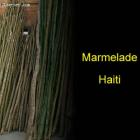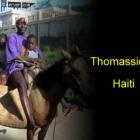ADVERTISEMENT
jean-bertrand aristide - Haiti Observer Blog
jean-bertrand aristide, Haiti Observer Blog. Read the following articles about jean-bertrand aristide
Complaint against Jean-Bertrand Aristide by Members Victim of Cooperatives
A complaint was filed against Jean-Bertrand Aristide, former President, by the National Coordination of Members Victim of Cooperatives - (CONASOVIC) for conspiracy, fraud, theft and breach of trust.
Vast Swindling Leaves Members Ruined
CONASOVIC Coordonnateur, Rosemond Jean made clarifications that, former President of CNC - Council of Cooperatives, Henriot Petiote, Head of United Hearts, David Chery and former leader of the CADEC - Cooperative of Insurance Savings and Credit have also been pursued in the complaint by Members Victim of Cooperatives.
During the bankruptcy of 2002-2003, all assets had been lost by the financial cooperative members numbering thousands who had joined the scheme attracted by the 10% interest rate promised. There was a collapse of the get rich scheme due to the vast swindle thus leaving the members ruined and Haiti, much poorer.
Ertha Pascal-Trouillot
Despite the changing gender roles and the growing feminist movement, female presidents or heads of state are quite rare in Haiti. One of these very few powerful women in history is former Haitian president Ertha Pascal-Trouillot. Politics has always been said to be meant for males as power and control are often associated with being a man. But as time went by, women began competing with this notion and have been made leaders and politicians along with men.
Pascal-Trouillot was born in a suburb of Haiti's capital Port-au-Prince in 1943. Her father was an iron worker while her mother was a seamstress and was the ninth child of their ten children. The future president acquired a law degree from the prestigious École de Droit des Gonaives and was a judge for federal courts for more than ten years. She then became the first woman justice of the country's Supreme Court. And in 1990, Pascal-Trouillot was proclaimed as Haiti's temporary president after the successful revolt against former president Prosper Avril which put him out of office.
Complaints against Jean-Bertrand Aristide by former child of "La Fanmi Se Lavi"
After being away from the limelight for so long and finally returning to Haiti from seven years of exile just last year, former president and Catholic priest Jean-Bertrand Aristide is faced with another big controversy. Only this time, it does not involve his rather unfavorable presidency in the past.
Former street children who were rescued by La Fanmi Se Lavi, a foundation established by Aristide when he was still a priest and before he was elected as the president of Haiti in 1990, recently filed a complaint against Aristide under the "Association of Victims of exploitation of the Fanmi Se Lavi". According to the association's president, Junior Restauno, the former Haitian priest and president used the foundation and the children for his personal gain. They have only received a few trips abroad while in the care of the foundation but have not yet been able to receive any other kind of needed assistance from the aid, especially in the financial aspect, Aristide acquired from the foundation's benefactors. Aside from this, the association's complaint also mentioned the former religious leader's physical violence and corruption.
Jean Bertrand Aristide Eyeing Jean Hector Anacasis Senate Seat
Talks have been circulating that former two-time Haiti President Jean Bertand Aristide is planning to run for Senate. According to reports, he, who was ousted from the presidency twice, is aiming for the seat in the Ouest Department. If the reports turn out to be true, he may run against other notable nominees such as Haitian National Police Chief Mario Andresol and singer Jacques Sauveur.
The reports of his Senate plans did not sit well with critics. As a matter of fact, it is seen as Jean Bertrand Aristide's strategy to escape a possible prosecution of justice. In a commentary, Radio Metropole host Nancy Roc said that once elected, he will have parliamentary immunity, which can help him avoid prosecution. Roc also reminded listeners on the dispute between Aristide and current President Michel Martelly. Many people think that Martelly had a hand on both coups against the former president.
Since the beginning of time, no Haitian president has run for Senate after his term. Should Jean Bertrand Aristide push through with the candidacy and win, he would probably make history. Reports about his plans came out despite Aristide's previous comments that he does not have plans to enter politics again. Aristide has been out of the public eye since he returned to the country last year. Instead of involving himself in politics, he simply focused his time and energy on operating his schools and universities.
Jean Hector Anacasis is the incumbent senator of the Ouest Department. He is running once again, along with Marie Denise Claude, Claudy Gassant, and Jean Mary Claude Germain.
The Massacre at Raboteau
The Massacre at Raboteau began April of 1991, pro-democracy candidate Jean-Bertrand Aristide won the Haitian presidency. Immediately following his victory, the de facto military dictatorship (FRAPH) Front for the Advancement and Progress of Haiti, obstructed Aristide's right to take office with a coup d'etat. In response, the citizens of Raboteau demonstrated, disseminated pro-Aristide literature, and even hid fugitives. During this overthrow of the nascent democratic government, FRAPH beat and killed 26 victims, according to News Haiti, but unofficial estimates put the total at 50.
In the same month, FRAPH invaded every home in Raboteau, arresting, beating and, sometimes, throwing their victims like garbage into open sewers. They also pursued those who escaped, stalking the citizens, arresting, torturing and/or shooting them. They even went so far as to commandeer citizen fishing vessels, shooting at escapees fleeing by sea. As a final malicious act, FRAPH refused to let victims' relatives claim their bodies.
The Sacrilege of the St. Jean Bosco Massacre targeting Jean-Bertrand Aristide
The St. Jean Bosco Massacre in Port-au-Prince occurred on September 11, 1988, in which 13 to 50 parishioners were slaughtered, according to varying sources, and the church burnt to the ground. At the time Jean-Bertrand Aristide, a Roman Catholic priest of the Salesians of the Don Bosco order, was saying mass, when the building was rushed by terrorists. Protectors hurried Aristide out of the church to a barricaded residence in one of the outlying church buildings.
The St. Jean Bosco Massacre was not the first time or last Aristide's life would be endangered. He'd already defied six or more attempts on his life, since in 1985 a mass he celebrated incited surfacing tensions, which presaged the coup of Jean-Claude Duvaliers's dictatorship. Following the massacre, the Inter-American Commission on Human Rights reported that a group of participants in the massacre appeared on Télé Nationale, Haiti's government-owned television station, and promised a 'heap of corpses' at any mass that Aristide celebrated.
The two Terms Haitian President Rene Preval
Haitian politics has been shaped by decades of power struggles between people in power, as well as with the country's citizens. Long-time politician René Préval has witnessed and experienced them all.
Before becoming a politician, Préval first became an agronomist, which has something to do with the science and technology of agriculture. After acquiring his studies in Belgium and Italy and living in New York for five years, he went home to Haiti and worked for the National Institute for Mineral Resources and was very active in agricultural activities in Haitian society. Préval then put up his own bakery and remained active political movements and charity, which led him to meet Jean-Bertrand Aristide, the country's first democratic president. In 1991, he served as Haiti's Prime Minister for eight months before going into exile after a military coup.
Professor Jean-Claude Bajeux is Dead
A defender of Human rights in Haiti lost his own battle. Professor Jean-Claude Bajeux, died on Friday, August 5, 2011. According to a family member, he died of lung cancer at home Port-au-Prince.
His political and social activist movement started in 1964 when Jean-Claude Bajeux was forced into exile under the Duvalier regime, after attempting to organize Haiti's Catholic clergy in protest of the expulsion of the Jesuit order.
He became leader of the political party Konakom and a supporter of former President Jean-Bertrand Aristide.
Jean-Claude Bajeux and his family left Haiti in October 1993 due to threats made on his life. He was harassed by members of the Front for the Advancement and Progress of Haiti, known as FRAPH. He returned to Haiti in 1994 until his death. Professor Jean-Claude Bajeux died on Friday, August 5, 2011, at his house.
Canadian government faired Jean-Bertrand Aristide return after Earthquake
In a document released recently by The Canadian Press news agency, it was announced that The Canadian government had great concerns that the Haitian population would be involved in a popular uprising and create a chaotic condition in Haiti.
Danm, an opportunity missed by Jean-Bertrand
Canadian government also faired that because of the confusion that follows after the earthquake, former Haitian President Jean-Bertrand Aristide would organize a return to power.
The news also revealed that the quick responce by Canada to the Haiti following the earthquake was in part driven by concerns for the stability of the Haitian government.
Jean-Bertrand Aristide will be in Haiti on Thursday, March 17
Contrary to what the US government would hope for, former Haitian president Jean-Bertrand Aristide is planning to return to Haiti on Thursday, March 17, three days before the March 20 election. Aristide ignores the recommendation of the US government who suggested that he waited until after Haiti election to return.
It seems that the US Government does not have that much leverage over the South African government. The United States wanted the South African government to hold Aristide there until after the election. However, according to South African Deputy Foreign Minister Marius Fransman: "It is not our responsibility to say if Jean-Bertrand Aristide should or should not leave South Africa".
Our objective is to share with you news and information about Haiti and the people of Haiti. Traditions, habits and the way we were or grew are alive in this site. We highly recommend that you Subscribe to our Newsletter and also share with us some of the things that are memorable and made us unique people.

 Newsletter
Newsletter  Haitian Thanksgiving
Haitian Thanksgiving  La Chapelle, Haiti
La Chapelle, Haiti  Marmelade, Haiti
Marmelade, Haiti  Thomassique, Haiti
Thomassique, Haiti